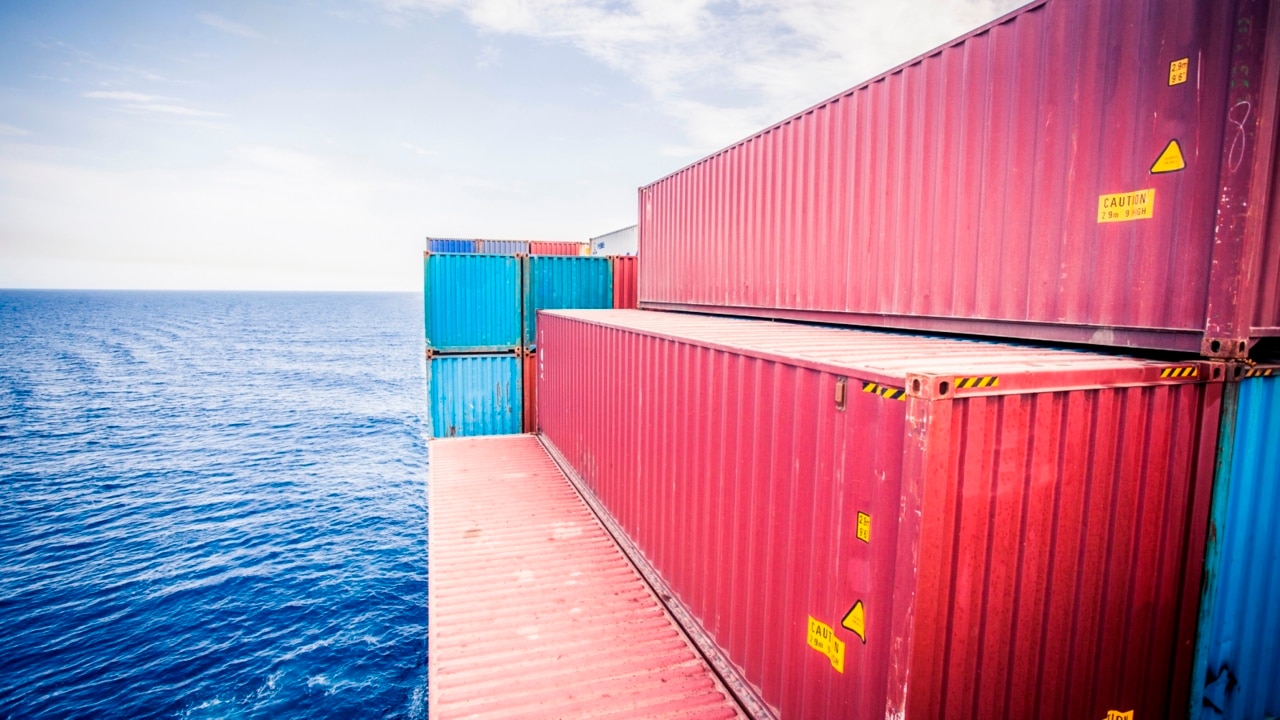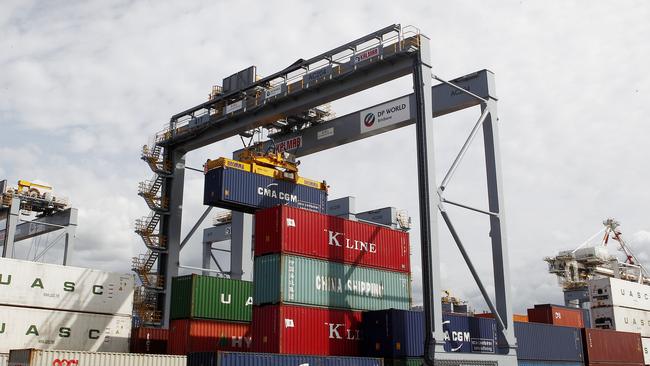Australia faces supply chain crunch as DP World works to fix cyber breach
One of Australia’s largest port terminal operators, DP World, is slowly restarting operations after a cyber breach which risks fuelling inflation and forcing the hand of the RBA.

Australia could suffer supply chain disruptions lasting for weeks as DP World – one of the country’s largest port terminal operators – slowly brings its systems back online after a serious cyber attack forced a shutdown of its operations.
With an estimated 30,000 shipping containers stranded, a supply shock could push up inflation and force the Reserve Bank to raise interest rates for a fourteenth time, experts have warned, putting pressure on DP World to quickly fix the cyber breach.
DP World on Monday said following testing overnight, services had slowly began to resume at 5.40am at DP World’s Brisbane port, with vessels which have dwelled the longest prioritised.
Services followed in Melbourne just after 7am, however export boxes are causing issues, according to the FTA Alliance.
In Sydney, DP World’s Port Botany port opened just after 8am. Only imports will be allowed.
at Fremantle in Western Australia where limited services resumed around 10pm local time overnight.
DP World had said on Sunday it made “significant strides” in addressing the incident and was testing key systems crucial for the resumption of normal operations and regular freight movement. The company did not provide a timetable for when it would be operational.
“DP World Australia is working closely with government and private sector stakeholders to identify and retrieve sensitive inbound freight,” the stevedoring company said.
But NSB Cyber co-founder and chief executive Shane Bell said recent breaches had shown regaining control could take a long time.
“Incidents like this can be highly complicated to contain, particularly in IT environments that serve multiple operational purposes. Hence, when the connection to the internet is triggered as an early containment action, there can be indirect impacts to systems or operations that are potentially not even in the blast zone for the incident,” Mr Bell said.
“Once they are in and they have been in for a while, they can be very hard to dislodge. And it is only after you dislodge them that you can safely return to normal operations. It can be a highly complicated and time-consuming process that by necessity has to operate 24/7 until you have taken back control.”
DP World has said it is working with authorities to ensure sensitive freight cargoes can be unloaded safely, but industry experts said there was a limit to how much could be done by hand, especially with industrial action looming over the port operator.
DP World’s Australian ports handle about 40 per cent of the goods flowing in and out of Australia, and AMP Capital chief economist Shane Oliver said prolonged disruptions would be damaging

“If it is a few days then I think we can get through without too much impact. But if it is weeks, however, it could be a supply shock and they tend to be inflationary. That would mark a bigger problem and then it also presents a dilemma for the reserve bank,” Dr Oliver said.
“The last time we had major supply disruptions, coming out of the pandemic, people were happy to spend and interest rates were a lot lower. This time around, you do run the risk that if you raise interest rates in response that would further increase the risk of a recession.”
The Reserve Bank has increased interest rates 13 times in its most aggressive tightening cycle in decades, and still expects inflation to return to its target only by 2025.
New RBA governor Michele Bullock has said the board is determined to act if it believes inflation remains out of control, but there are growing signs that the country’s $2.5 trillion economy is rapidly slowing.
Analysts believe the RBA has signalled it hopes to avoid a 14th interest rate rise, but the central bank would have to move if its forecasts were affected.
Meanwhile, Australian infrastructure companies could seek to mitigate the impact of the cyber attack by shifting to other port terminals, and Ports Australia on Sunday moved to assure observers that the problem was limited to the terminals operated by DP World.
“The current disruption is isolated to DP World terminals. Australia’s ports and other terminals remain operational,” Ports Australia said.
But Peter Van Duyn, a researcher at Deakin University’s Centre for Supply Chain & Logistics, said there was little prospect of being able to shift terminals and the problems would intensify in the coming days.
“The issues snowball. If you can’t move any containers then the storage yard is going to be completely full, and there will be a backlog of ships also waiting to unload,” Mr Van Duyn said.
“DP has a market share of about 40 per cent and while you might be able to do some minor changes to other terminals, those will have little capacity to unload such a market share.”
The DP World breach, which began last week, caps a tumultuous period of cyber upheaval.
Australia has been hit by a string of attacks, with Optus and Medibank in the firing line.
Russian hackers accessed the health records and other personal information from almost 10 million Medibank customers.
Home Affairs Minister Clare O’Neil on Sunday acknowledged the seriousness of the breach. “The cyber incident at DP World is serious and ongoing. DP World manages almost 40 per cent of the goods flowing in and out of our country, and this incident is affecting the ports of Melbourne, Fremantle, Botany and Brisbane.”
DP World entered the Australian market in 2006 after paying £3.3bn for P&O’s global operations in 2006 and a $US1.15bn deal with CSX World Terminals in 2004.








To join the conversation, please log in. Don't have an account? Register
Join the conversation, you are commenting as Logout